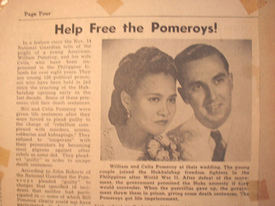
William J. Pomeroy, a legendary fighter for the independence and freedom of the Filipino people and a staunch member of the Communist Party USA, died in London Jan. 12. He was 92.
Pomeroy was born in Waterloo, N.Y. Nov. 25, 1916. He joined the Young Communist League in 1937, the same year he found a job as a factory worker in Rochester, N.Y. A year later, he joined the Communist Party USA, serving as education director of the New York party. He was a member of the CPUSA until his death.
Pomeroy provided a steady stream of articles to the People’s Weekly World on developments in Africa, Latin America, Asia, Europe, and above all, the Philippines into the late 1990s when failing eyesight made it impossible for him to continue.
As recently as last Nov. 7, Pomeroy and his wife Celia Mariano-Pomeroy, were reelected honorary members of the Political Bureau of the Partido Komunista ng Pilipinas (PKP) at the Party’s 13th Convention in Manila.
“Comrade William J. Pomeroy, a great Filipino patriot, and a great communist will be mourned by comrades and friends on several continents,” said a statement signed by Pedro P. Baguisa, General Secretary of the PKP. “His works will always be a source of inspiration for our Party and his memory will live on in the hearts of all our Party members.”
During World War II, Pomeroy was deployed with the Fifth Air Force under General Douglas MacArthur. He was with the U.S. troops who fought their way from Australia, landing in Leyte in Oct. 1944. While serving as a writer with the U.S. Army’s Historical Section, he helped chronicle the U.S. battles for the Philippines and Okinawa and the early U.S. occupation of Japan.
During his deployment in combat operations in Pampanga Province and Manila, Pomeroy contacted the Hukbalahap forces, better known as “Huks,” then waging a guerrilla war against the Japanese invaders. He organized solidarity assistance with the Huks, including the delivery of mimeograph machines and other printing supplies to the Communist-led partisan army.
He also organized protests against the U.S. decision to wage war against the Huks even though they were allies fighting a common enemy, the Japanese army.
After his discharge, he returned to the Philippines in 1947 where he enrolled at the University of the Philippines. There he served as ghost writer for an autobiography of Luis Taruc, a leader of the PKP, titled “Born of the People.” The book had to be smuggled out of the Philippines and delivered to International Publishers in New York where it was published in 1953. In the meantime, he had met Celia Mariano. They married in 1948.
The young couple joined in the post-war armed struggle for socialism, an ill-fated effort that ended in defeat. The PKP’s lengthy obituary credits the Pomeroys with helping convince the PKP leadership during a strategy meeting in the Mountains of Nueva Ecija Province that “there was no prospect of a quick victory and that the Party should be prepared for a long-term struggle which would need the rebuilding of mass organizations to lead the masses in all forms of legal battles.”
Pomeroy and his wife were arrested and spent a decade in prison in the Philippines. A world-wide struggle resulted in Philippine President Carlos P. Garcia granting executive clemency in 1962 on condition that they leave the Philippines within a month.
Pomeroy had hoped to return to the United States with Celia but she was denied a U.S. passport. Pomeroy returned to the U.S. alone. He immediately produced his first post-prison book, “The Forest” (International Publishers, 1963), a personal account of the two years he and Celia spent together with the Huk guerrillas in the Sierra Madre Mountains from April 1950-1952. He also arranged for the publication by International Publishers of “Rice Grains” a book of poems by Amado V. Hernandez.
Unable to win a passport for Celia amid the Cold War anti-communist hysteria, the Pomeroys settled in London.
He continued to pour out a torrent of books and articles: “Apartheid, Imperialism, and African Freedom”; “Apartheid Axis: United States and South Africa”; “American Neo-Colonialism: Its Emergence in the Philippines and Asia”; “Guerrilla Warfare and Marxism”; a volume of poetry, “Beyond Barriers”; and a collection of short stories, “Trail of Blame.”
Among his most touching books, is “Sonnets for Celia,” a slim volume of love poems he composed for his wife while they were in prison. Their devotion to each other never waned. Celia lives still in the London retirement community they moved to in their final years together.
A year ago, January, Pomeroy sent greetings to the PWW staff and readers. “Unfortunately, I am totally blind and unable to do more than dictate this to you: A happy new year to you and all our comrades….our spirits remain high and we maintain our vision of a socialist future.”









